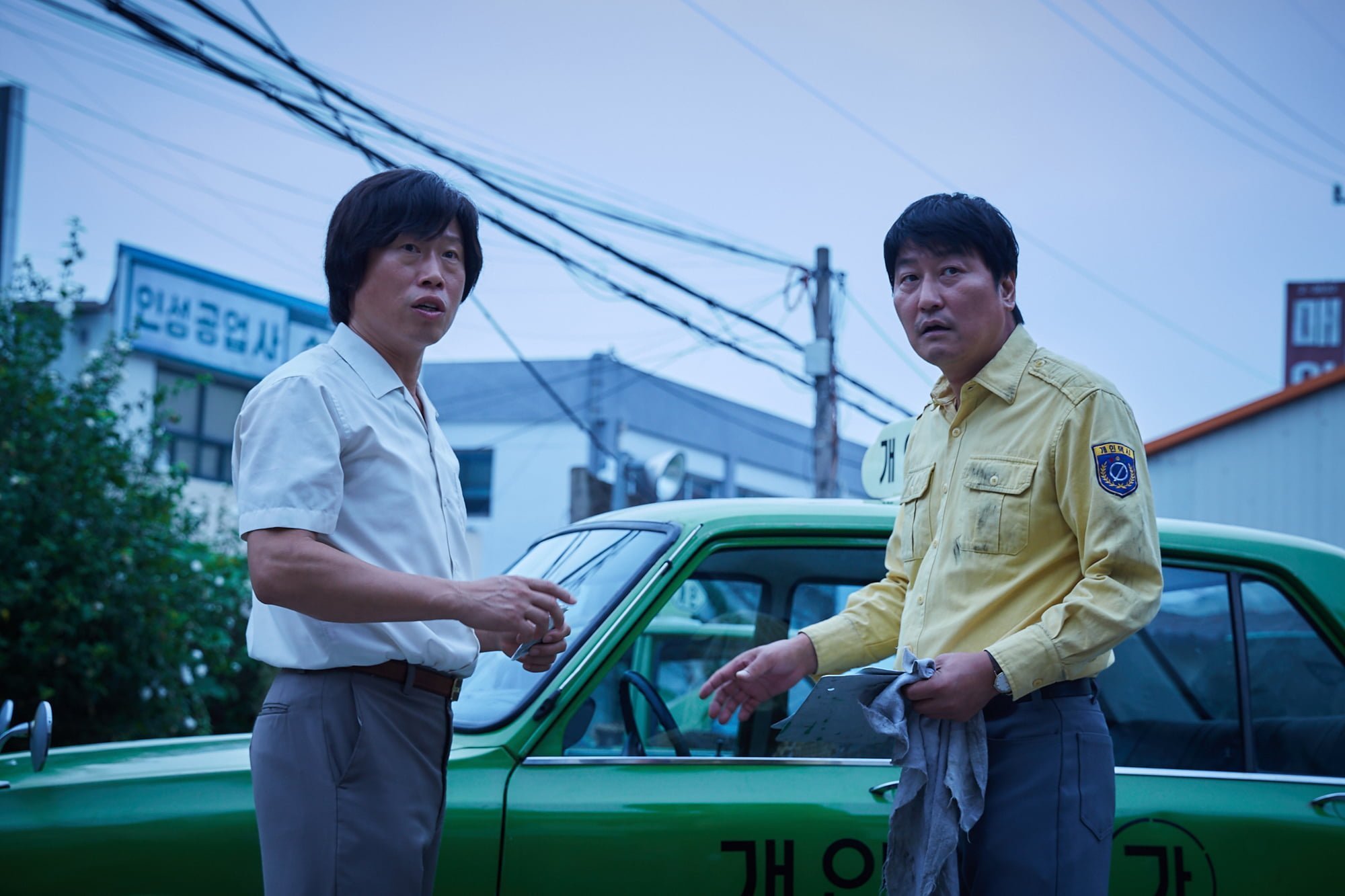The Korean historical drama A Taxi Driver tries to balance melodrama, social consciousness, and a character study at the same time. Aside from some languid pacing (clocking in at an unjustifiable two hours and seventeen minutes) and a climax that dangerously edges close to Michael Bay territory, it succeeds. Just as director Hoon Jang’s retelling of the 1980 Gwangju Uprising starts to take a wrong turn, there’s always something worthwhile to get viewers back on track.
It’s May 20, 1980 and a military coup has led to martial law in the country. The state of emergency means little to Seoul based taxi driver Kim (Kang-ho Song), a former military sergeant with more personal and pressing matters on his plate. A widower with an eleven year old daughter to look after, Kim struggles to get himself out of debt and keep his steadily declining, avocado green taxi on the road. Desperate to make enough money to pay off four months of past due rent, Kim overhears of a potential job that could solve all his monetary problems. Kim rushes to the airport to pick up German reporter Jürgen Hinzpeter (Thomas Kretschmann) and transport him from Seoul to Gwangju, where he’ll be covering protests that military government has responded to violently. Although Kim speaks a small amount of English, a language barrier remains between the two, but translation isn’t one of their biggest problems. The city of Gwangju has been effectively blocked off by military forces, and once they get into the country, the regime’s airtight media blackout makes smuggling footage out of the area easier said than done. Both men approach the journey at first from monetary and selfish perspectives, but after they witness the atrocities being carried out in Gwangju, they’ll be changed forever.
Hinzpeter was one of the very few journalists who were able to smuggle footage of military overreach out of Korea during the incident, and he did indeed have a brave, taxi driving valet taking deep into the line of fire, so there’s no questioning that A Taxi Driver has its feet in a true story. The problem with adapting such a story is that no one – not even the late Hinzpeter – knew much about the man behind the wheel. As such, Hoon Jang (best known for the cult classic action flick Rough Cut) shows the plight of the Gwangju people – where most of the protestors were university students – through the eyes of a wounded man bitter about his own lot in life. If one were to boil A Taxi Driver to its essence, it’s yet another story of a selfish, barely caring human being learning to be less of a jerk. These kinds of narratives are a dime a dozen, but the historical backdrop makes something about Kim’s transition into becoming a better person feel more organically earned.

A Taxi Driver wants to be a film lecturing about the many reasons why everyday people shouldn’t stand idly by in the face of great injustices, even if it means going against one’s own government. There’s an undeniable amount of parallels that could be made between Hoon Jang’s work here and the current state of global affairs, but the story sticks to its time period and task admirably. Gorgeously lensed and tightly directed, A Taxi Driver escalates slowly, but surely while remaining captivating to behold. Kim’s car and bright yellow shirt might blend into the background of his home city of Seoul, but on the streets of Gwangju standing opposite a white man, he sticks out like a walking target.
Once the reporter and driver start witnessing firsthand just how low the military is willing to stoop in a bid for control, A Taxi Driver escalates at points with great intensity. It takes a long time to get there, though, and spends not nearly enough time focusing on larger themes and character traits. There are few too many segments where Kim tries to explain how little he cares for the protestors at first, trying to hustle his passenger to give him money up front, making fun of the English speaking German reporter in Korean to his unknowing face, and generally acting like a bit of a weasel. There are even several points after Kim knows exactly how dangerous things have become where he abandons his passenger to just sulk and existentially ponder. It helps that Song’s performance is consistently engaging and watchable – imbuing the character with a wealth of humanity that isn’t on the page – but Hoon Jang can’t find a way to pace everything properly.
Once the action starts, there are some definite visceral thrills to behold and fears to feel, but it also leads to a credulity straining climax that fetishizes the violent outbursts of war a bit too much. Viewers will know that these were real people who lived through such an incident by the time the credits begin, so it’s more than a little curious that a film so dedicated to hammering on the “based on a true story” key that it leads to something so implausible and overly stylized. The final third of A Taxi Driver feels trucked in from a more exciting film, but perhaps not one that’s as dramatically satisfying.
Still, there’s plenty worth admiring in A Taxi Driver, and it’s one of those situations where the good definitely outweighs the bad. It could stand to lose almost a full thirty minutes of its running time, but the approach, setting, and overall background of the story are original enough to hold everything together. A Taxi Driver takes a very roundabout way of getting viewers where they need to go, but it gets there nonetheless.
A Taxi Driver opens in Toronto, Edmonton, Calgary, and Vancouver on Friday, August 11, 2017.
Check out the trailer for A Taxi Driver:
Join our list
Subscribe to our mailing list and get weekly updates on our latest contests, interviews, and reviews.

